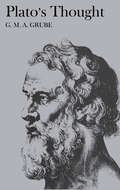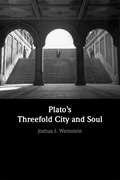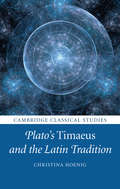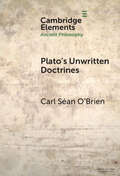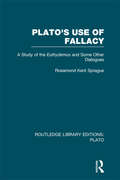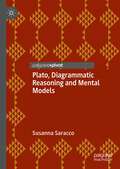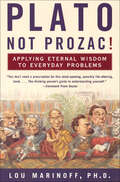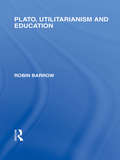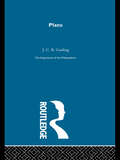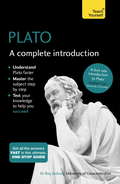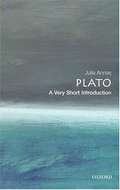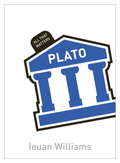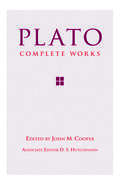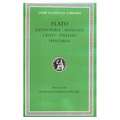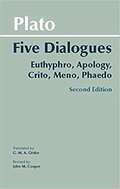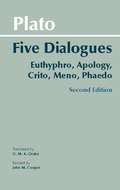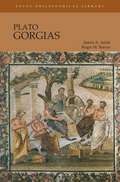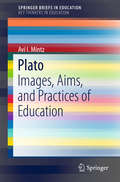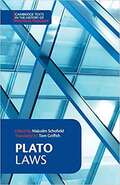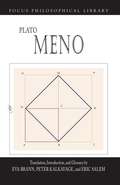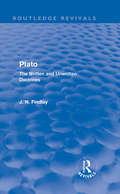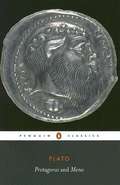- Table View
- List View
Plato's Thought
by G. M. GrubePlato's Thought offers an excellent introduction to Plato, guiding the reader through Plato's Theory of Forms, and examining his views on art, education and statecraft. This edition includes an introduction, bibliographic essay, and bibliography by Donald Zeyl.
Plato's Threefold City and Soul
by Joshua I. WeinsteinPlato's 'Republic' constructs an ideal city composed of three parts, parallel to the soul's reason, appetites, and fighting spirit. But confusion and controversy have long surrounded this three-way division and especially the prominent role it assigns to angry and competitive spirit. In Plato's Three-fold City and Soul, Joshua I. Weinstein argues that, for Plato, determination and fortitude are not just expressions of our passionate or emotional natures, but also play an essential role in the rational agency of persons and polities. In the Republic's account, human life requires spirited courage as much as reasoned thought and nutritious food. The discussion ranges over Plato's explication of the logical and metaphysical foundations of justice and injustice, the failures of incomplete and dysfunctional cities, and the productive synergy of our tendencies and capacities that becomes fully evident only in the justice of a self-sufficient political community.
Plato's Timaeus and the Latin Tradition (Cambridge Classical Studies)
by Christina HoenigThis book focuses on the development of Platonic philosophy at the hands of Roman writers between the first century BCE and the early fifth century CE. It discusses the interpretation of Plato's Timaeus by Cicero, Apuleius, Calcidius, and Augustine, and examines how these authors created new contexts and settings for the intellectual heritage they received and thereby contributed to the construction of the complex and multifaceted genre of Roman Platonism. It takes advantage of the authors' treatment of Plato's Timaeus as a continuous point of reference to illustrate the individuality and originality of each writer in his engagement with this Greek philosophical text; each chooses a specific vocabulary, methodology, and literary setting for his appropriation of Timaean doctrine. The authors' contributions to the dialogue's history of transmission are shown to have enriched and prolonged the enduring significance of Plato's cosmology.
Plato's Unwritten Doctrines (Elements in Ancient Philosophy)
by Carl Séan O'BrienThis Element examines the arguments advanced by the Tübingen-Milan School in support of the claim that Plato had Unwritten Doctrines (agrapha dogmata), revealed in Aristotle and other testimonia and indicated – but not explicitly treated – in some of his dialogues. The Unwritten Doctrines are primarily concerned with Plato's Theory of Principles of (the One and the Indefinite Dyad) which accounts for unity and multiplicity respectively. This Element considers two opposing approaches to reading Plato: that of sola scriptura (through the writings alone) or via the tradition. While it may appear counter-intuitive to privilege other sources over Plato's own works, his criticism of writing in the Phaedrus and the 'deliberate gaps', where he teases the reader with the possibility of a fuller response than that provided on the current occasion, firmly indicate the existence of doctrines not committed to his dialogues.
Plato's Use of Fallacy: A Study of the Euthydemus and some Other Dialogues (Routledge Library Editions: Plato)
by Rosamond K SpragueThere are many fallacious arguments in the dialogues of Plato. The author argues that Plato was fully conscious of the fallacious character of at least an important number of these arguments and that he sometimes made deliberate use of fallacy as an indirect means of setting forth certain of his fundamental philosophical views. Plato introduces them, the author maintains, for the purpose of working out their implications. Plato is thus able to expose them for what they are, to clear away possible lines of attack upon his own position, and even to show that when the proper correction is applied his own views receive support.
Plato, Aristotle, and the Purpose of Politics
by Kevin M. CherryIn this book, Kevin M. Cherry compares the views of Plato and Aristotle about the practice, study, and, above all, the purpose of politics. The first scholar to place Aristotle's Politics in sustained dialogue with Plato's Statesman, Cherry argues that Aristotle rejects the view of politics advanced by Plato's Eleatic Stranger, contrasting them on topics such as the proper categorization of regimes, the usefulness and limitations of the rule of law, and the proper understanding of phronēsis. The various differences between their respective political philosophies, however, reflect a more fundamental difference in how they view the relationship of human beings to the natural world around them. Reading the Politics in light of the Statesman sheds new light on Aristotle's political theory and provides a better understanding of Aristotle's criticism of Socrates. Most importantly, it highlights an enduring and important question: Should politics have as its primary purpose the preservation of life, or should it pursue the higher good of living well?
Plato, Diagrammatic Reasoning and Mental Models
by Susanna SaraccoThis book analyses the role of diagrammatic reasoning in Plato’s philosophy: the readers will realize that Plato, describing the stages of human cognitive development using a diagram, poses a logic problem to stimulate the general reasoning abilities of his readers. Following the examination of mental models in this book, the readers will reflect on what inferences can be useful to approach this kind of logic problem. Plato calls for a collaboration between writer and readers. In this book the readers will examine the connection between diagrams and discovery, realizing the important epistemic role of visualization. They will recognize the crucial role that diagrams play in problem solving. The logic problem elaborated by Plato is addressed considering the epistemic function of mental models. These models introduce to an advanced stage of cognitive development, in which reasoning uses in its investigations a higher-level of mathematical complexity, represented by structuralism.
Plato, Not Prozac!: Applying Eternal Wisdom to Everyday Problems
by Lou MarinoffPhilosophy professor Lou Marinoff, Ph.D. offers eternal wisdom to help cope with everyday problems in Plato, Not Prozac!“You don’t need a prescription for this mind-opening, possibly life-altering book. . . . The Thinking person’s guide to understanding yourself.” —Cleveland Plain DealerIf you’re facing a dilemma—whether it’s handling a relationship, living ethically, dealing with a career change, or finding meaning in life—the world’s most important thinkers from centuries past will help guide you toward a solution compatible with your individual beliefs. From Kirkegaard’s thoughts on coping with death to the I Ching’s guidelines on adapting to change, Plato, Not Prozac! makes philosophy accessible and shows you how to use it to solve your everyday problems.Gone is the need for expensive therapists, medication, and lengthy analysis. Clearly organized by common problems to help you tailor Dr. Lou Marinoff’s advice to your own needs, this is an intelligent, effective, and persuasive prescription for self-healing therapy that is giving psychotherapy a run for its money. “Philosophy [to Marinoff] is the Lava bar of intellect—meant to be used every day, down to the nub.” —San Francisco Examiner“Plato, Not Prozac! looks to become the bible of the ‘philosophical counseling’ movement.” —Philadelphia Inquirer Magazine“The ancient thinkers often characterized philosophy as ‘medicine for the soul.’ Marinoff provides a generous dose throughout these lively pages. I highly recommend it!”—Tom Morris, Ph.D., author of Plato’s Lemonade Stand
Plato, Utilitarianism and Education (International Library of the Philosophy of Education Volume 3)
by Robin BarrowThree lines of argument are central to this book: that Plato's views as expounded in the Republic indicate that he was a utilitarian; that utilitarianism is the only acceptable ethical theory; that these conclusions have significant repercussions for education. Throughout the book the exposition of utilitarianism and the interpretation of the Republic are closely linked. The author assesses the nature of recent Platonic criticism and provides a critical summary of the Republic. He expounds and defends utilitarianismn and examines in greater depth the consequences for education of accepting a utilitarian position, showing how, for example, from this standpoint such key terms in educational debate as 'autonomy' and 'self-development' must be reassessed as educational objectives.
Plato-Arg Philosophers
by J.C.B. GoslingThis book is available either individually, or as part of the specially-priced Arguments of the Philosphers Collection.
Plato: A Complete Introduction: Teach Yourself
by Roy JacksonWritten by Dr Roy Jackson, who Senior Lecturer at the University of Gloucestershire, Plato: A Complete Introduction is designed to give you everything you need to succeed, all in one place. It covers the key areas that students are expected to be confident in, outlining the basics in clear jargon-free English, and then providing added-value features like summaries of key books, and even lists of questions you might be asked in your seminar or exam.The book uses a structure that mirrors the way Plato is taught on many university courses, with chapters including: the pre-socratics; Socrates; who was Plato?; can virtue be taught?; piety; the philosophical life; obeying the law of Athens; the Soul; knowledge as recollection; the forms; Plato's state; education and morality; Plato and art; the Later Period; Aristotle, Plato's great pupil; Neoplatonism; Plato and religion; Plato's legacy.
Plato: A Very Short Introduction
by Julia AnnasJulia Annas covers Plato's style of writing, and delves into discussions of love and philosophy, his attitude towards women and towards homosexual love. Finally, she explores Plato's claim that virtue is sufficient for happiness and touches on his arguments for the immorality of the soul and his ideas about the nature of the universe.
Plato: All That Matters (All That Matters)
by Ieuan WilliamsIn Plato: All That Matters, Ieuan Williams argues that no one can study philosophy or politics without an awareness of Plato, whose work has reverberated through 2500 years of philosophy and history. Dr Ieuan Williams explains both what Plato thought, and why this continues to matter today. In the ten years of research which have led up to this book, Dr Williams has assessed the relevance of Plato to everything from the philosophy of education to media theory. This important book shows how Plato remains as relevant today as he has ever been.This accessible and readable book will appeal both to students and general readers, giving a fascinating introduction to Plato - and what matters most about his work.
Plato: All That Matters (Atm Ser.)
by Ieuan WilliamsIn Plato: All That Matters, Ieuan Williams argues that no one can study philosophy or politics without an awareness of Plato, whose work has reverberated through 2500 years of philosophy and history. Dr Ieuan Williams explains both what Plato thought, and why this continues to matter today. In the ten years of research which have led up to this book, Dr Williams has assessed the relevance of Plato to everything from the philosophy of education to media theory. This important book shows how Plato remains as relevant today as he has ever been.This accessible and readable book will appeal both to students and general readers, giving a fascinating introduction to Plato - and what matters most about his work.
Plato: Complete Works
by PlatoOutstanding translations by leading contemporary scholars--many commissioned especially for this volume--are presented here in the first single edition to include the entire surviving corpus of works attributed to Plato in antiquity. In his introductory essay, John Cooper explains the presentation of these works, discusses questions concerning the chronology of their composition, comments on the dialogue form in which Plato wrote, and offers guidance on approaching the reading and study of Plato's works.Also included are concise introductions by Cooper and Hutchinson to each translation, meticulous annotation designed to serve both scholar and general reader, and a comprehensive index. This handsome volume offers fine paper and a high-quality Smyth-sewn cloth binding in a sturdy, elegant edition.
Plato: Euthyphro, Apology Crito, Phaedo, Phaedrus (Loeb Classical Library #Volume 36)
by PlatoPlato, the great philosopher of Athens, was born in 427 BCE. In early manhood an admirer of Socrates, he later founded the famous school of philosophy in the grove Academus. Much else recorded of his life is uncertain; that he left Athens for a time after Socrates' execution is probable; that later he went to Cyrene, Egypt, and Sicily is possible; that he was wealthy is likely; that he was critical of 'advanced' democracy is obvious.
Plato: Euthyphro, Apology, Crito, Meno, Phaedo (Hackett Classics Series)
by Plato G. M. A. Grube John M. CooperThe second edition of Five Dialogues presents G. M. A. Grube's distinguished translations, as revised by John Cooper for Plato, Complete Works. A number of new or expanded footnotes are also included along with an updated bibliography.
Plato: Euthyphro, Apology, Crito, Meno, Phaedo (Hackett Classics)
by PlatoThe second edition of Five Dialogues presents G. M. A. Grube's distinguished translations, as revised by John Cooper for Plato, Complete Works. A number of new or expanded footnotes are also included along with an updated bibliography.
Plato: Euthyphro, Apology, Crito, Meno, Phaedo (second edition)
by Plato G. M. A. Grube John M. CooperSocrates was a well-known character, expounding his philosophy of life in the streets of Athens to anyone who cared to listen.
Plato: Gorgias
by Plato Roger M. Barrus James A. ArietiThis is an English translation of Plato's dialogue of Socrates seeking the true definition of rhetoric, with an attempt to show the flaws of the sophistic orators. Includes speeches from Thucydides' History of the Peloponnesian Wars that reflect Plato's themes. Focus Philosophical Library translations are close to and are non-interpretative of the original text, with the notes and a glossary intending to provide the reader with some sense of the terms and the concepts as they were understood by Plato's immediate audience.
Plato: Images, Aims, And Practices Of Education (SpringerBriefs in Education)
by Avi I. MintzThis book opens by providing the historical context of Plato’s engagement with education, including an overview of Plato’s life as student and educator. The author organizes his discussion of education in the Platonic Corpus around Plato’s images, both the familiar – the cave, the gadfly, the torpedo fish, and the midwife – and the less familiar – the intellectual aviary, the wax tablet, and the kindled fire. These educational images reveal that, for Plato, philosophizing is inextricably linked to learning; that is, philosophy is fundamentally an educational endeavor. The book concludes by exploring Plato’s legacy in education, discussing the use of the “Socratic method” in schools and the Academy’s foundational place in the history of higher education. The characters in Plato’s dialogues often debate – sometimes with great passion – the purpose of education and the nature of learning. The claims about education in the Platonic corpus are so provocative, nuanced, insightful, and controversial that educational philosophers have reckoned with them for millennia.
Plato: Laws (Cambridge Texts in the History of Political Thought)
by Tom Griffith Malcolm Schofield PlatóPlato's Laws is one of the most important surviving works of ancient Greek political thought. It offers sustained reflection on the enterprise of legislation, and on its role in the social and religious regulation of society in all its aspects. Many of its ideas were drawn upon by later political thinkers, from Aristotle and Cicero to Thomas More and Montesquieu. <p><p> This book presents the first translation of the complete text of the Laws for thirty-five years, in Tom Griffith's readable and reliable English. Malcolm Schofield, a leading scholar of Greek philosophy, introduces the main themes and characteristics of the work, as well as supplying authoritative notes on the structure and detail of Plato's argument, together with a guide to further reading. The book will be a key resource for those interested in Greek philosophy and of the history of political thought.
Plato: Meno (Focus Philosophical Library)
by Plato&“As one would expect from the team of Brann, Kalkavage and Salem, their edition of Plato's Meno is a fine one. The translation meets their stated goal of remaining 'as faithful as possible to the Greek, while using lively, colloquial English.' Their notes are consistently helpful and will be particularly useful to those readers willing to explore the nuances of Plato's extraordinary prose. Their introduction is clear and compact, and it highlights the most philosophically important themes of the dialogue. One particularly useful feature of this edition is the manner in which it displays the diagrams Socrates draws in order to illustrate his famous 'square within a square.' Instead of relegating them to the notes, it integrates them into the text of the dialogue itself. Readers are able to follow along, and 'watch' Socrates actually construct them." —David Roochnik, Boston University
Plato: Plato: The Written and Unwritten Doctrines (Routledge Revivals)
by John Niemeyer FindlayJ.N. Findlay, distinguished scholar and acknowledged expert on Plato, argues persuasively for a new interpretation of the Platonic writings. He believes that Plato's Unwritten Doctrines were present in the background of all the great philosopher's mature written work. With the use of Aristotelian and other writings on these reported doctrines he demonstrates that they admit of an intelligible elucidation and they direct indispensable light upon the full meaning of the written Dialogues. The author emphasizes the valuable use of Platonic notions and methods by the Neoplatonists and the Schoolmen as well as by such modern thinkers as Husserl and Russell. He also censures, as a great misinterpretation, the widespread Aristotelian view of Platonism as a two-world theory, and argues that, for Plato, the Ideas and their Principles alone have full reality, everything else being logically parasitic upon them. The work also includes two important Appendices, the first providing translations of the Aristotelian and other ancient material regarding Plato's oral teaching, the second criticizing and refuting the views of Harold F. Cherniss on the same material.
Plato: Protagoras and Meno
by Plato Adam Beresford Lesley BrownPlato's finest dramatic work, an entertaining tale of goodness and knowledge Exploring the question of what exactly makes good people good, Protagoras and Meno are two of the most enjoyable and accessible of all of Plato's dialogues. Widely regarded as his finest dramatic work, the Protagoras, set during the golden age of Pericles, pits a youthful Socrates against the revered sophist Protagoras, whose brilliance and humanity make him one the most interesting and likeable of Socrates' philosophical opponents, and turns their encounter into a genuine and lively battle of minds. The Meno sees an older but ever ironic Socrates humbling a proud young aristocrat as they search for a clear understanding of what it is to be a good man, and setting out the startling idea that all human learning may be the recovery of knowledge already possessed by our immortal souls.
